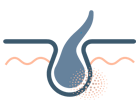Takeichi, T., & Akiyama, M. (2016). Inherited ichthyosis: Non-syndromic forms. The Journal of dermatology, 43(3), 242–251. https://doi.org/10.1111/1346-8138.13243
Bygum, A., Virtanen, M., Brandrup, F., Gånemo, A., Sommerlund, M., Strauss, G., & Vahlquist, A. (2013). Generalized and Naevoid Epidermolytic Ichthyosis in Denmark: Clinical and Mutational Findings. Acta Dermato Venereologica, 93(3), 309-313. doi: 10.2340/00015555-1447
Fischer, J., & Bourrat, E. (2020). Genetics of Inherited Ichthyoses and Related Diseases. Acta dermato-venereologica, 100(7), adv00096. https://doi.org/10.2340/00015555-3432
Ahmed, H., & O’Toole, E. A. (2014). Recent advances in the genetics and management of harlequin ichthyosis. Pediatric dermatology, 31(5), 539–546. https://doi.org/10.1111/pde.12383
Yoneda K. (2016). Inherited ichthyosis: Syndromic forms. The Journal of dermatology, 43(3), 252–263. https://doi.org/10.1111/1346-8138.13284
Vega Almendra, N., & Aranibar Duran, L. (2016). Ictiosis hereditaria: desafío diagnóstico y terapéutico [Hereditary ichthyosis: A diagnostic and therapeutic challenge]. Revista chilena de pediatria, 87(3), 213–223. https://doi.org/10.1016/j.rchipe.2015.07.025
Akiyama M. (2011). Updated molecular genetics and pathogenesis of ichthiyoses. Nagoya journal of medical science, 73(3-4), 79–90





